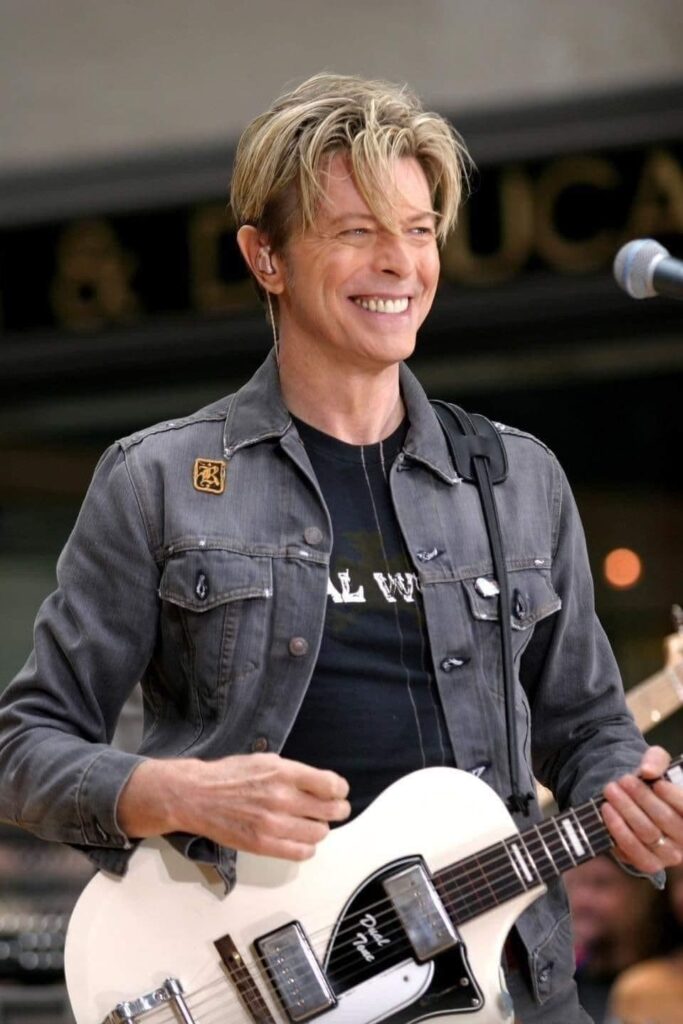
An Anthem For The Desperate Heart: The Two Lovers Who Kissed Away The Cold War.
There are certain songs that transcend the charts, becoming not merely popular tunes but colossal landmarks of cultural history—and David Bowie’s “Heroes” is one of them. It is an immense, pulsating, beautifully desperate cry of defiance and love, forged in the tension of a city divided. To hear it today is to be immediately transported back to a time of high-wire artistic risk and cold war urgency, where every note seemed to matter more than usual.
Released on September 23, 1977, by RCA Records, as the lead single from the album of the same name, “Heroes” was initially a modest commercial success. In an age when its revolutionary sound was still catching up with the public, the single peaked at Number 24 on the UK Singles Chart and failed to make a significant dent on the U.S. Billboard Hot 100 on its first release. However, its artistic reception was immediately glowing; critics recognized it as a masterpiece. Over the decades, its profound impact has continuously elevated its standing, leading to a surge to Number 12 in the UK upon Bowie’s passing in 2016, finally receiving the chart recognition that its legacy had long deserved.
The Divided City and The Secret Kiss
The unforgettable story behind “Heroes” is a poignant piece of musical folklore, rooted firmly in the geography of a divided Europe. In 1977, Bowie was living in self-imposed exile in West Berlin, seeking creative rejuvenation and sobriety away from the excesses of Los Angeles. He recorded the song, the title track of his second album in the legendary “Berlin Trilogy,” at Hansa Studio 2, often referred to as “Hansa by the Wall.”
Crucially, the studio window overlooked the infamous Berlin Wall, a bleak scar on the city’s heart. Bowie had a direct view of the concrete and the guard towers. One afternoon, while working, he looked out and saw his producer, Tony Visconti, engaged in a passionate kiss with a background singer, a German woman named Antonia Maass, right by the forbidding structure. Since Visconti was married at the time, Bowie initially shielded his friend’s secret, inventing the story of two anonymous lovers.
The vision of that clandestine, dangerous embrace—two people stealing a fleeting moment of intimacy and freedom in the shadow of institutional oppression—became the lyrical catalyst for the song. It was the epitome of ordinary people rising to an extraordinary moment. The line “I, I can remember / Standing by the wall / And the guns shot above our heads / And we kissed as though nothing could fall” is a direct, immortalized reference to that illicit, defiant rendezvous.
The Art of Desperate Hope
Co-written with avant-garde pioneer Brian Eno, the track is a monument to studio innovation. It’s built on a mesmerizing, throbbing low-end, a hypnotic two-chord progression, and features a towering, soaring guitar line from King Crimson’s Robert Fripp, who recorded his part having never heard the song before. Visconti’s innovative use of three separate microphones, each progressively opening up as Bowie’s voice became louder, creates the song’s famous sonic effect: as Bowie sings, his voice gains depth, presence, and a frantic, desperate echo that crescendos into a magnificent, near-unhinged scream of passion and possibility.
The core meaning of “Heroes” lies in that central, breathtaking qualification: “We can be heroes, just for one day.” It’s not a grand, naive promise of eternal triumph, but an acceptance of human frailty—the recognition that greatness, or even just sheer survival, is often achieved in small, defiant bursts. It’s about the power of an individual act of love or courage to momentarily defeat monumental forces of fear and division. It tells us that we don’t have to be King and Queen forever, we only need the resolve to beat the world just for one day.
The song’s legend was cemented ten years later, in 1987, when Bowie performed it at a concert near the Wall in West Berlin. Thousands of East Berliners gathered on their side, listening in defiance. Bowie would later recall that it was one of the most emotional performances of his life, hearing the cheers echo from the other side. This song of a secret, passionate kiss truly became an unlikely, powerful prayer for freedom, a message sent across the great historical divide that time and love—even if only for a few stolen minutes—will always conquer walls.